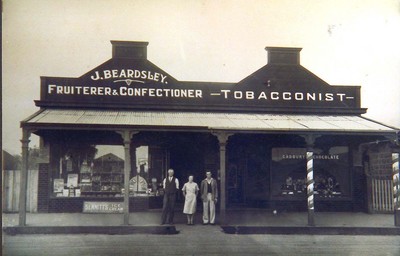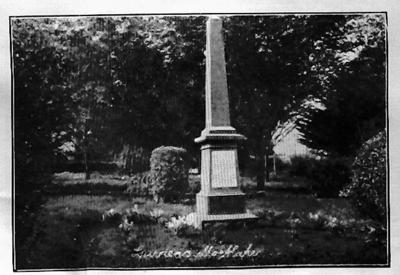Projects
 |
The Dunlop Street Project
Through interviewing senior residents and gleaning information
from old issues of the Mortlake Dispatch, MDHS is recording the uses to
which all sites and buildings in the commercial precinct of Mortlake
have been put over the decades. Our photographic collection includes
many photos of businesses and buildings from the 1860s onwards which
adds to the profile we have of Mortlake in the past. It is hoped that
eventually we will be able to publish a book on 'Old Dunlop Street'.
|
|
Cemetery Database
An ongoing project has been putting the Mortlake Cemetery records
onto a database. The records indicate that some 1,604 interments have
taken place at Mortlake since 1855 although we have confirmed that at
least 250 burials were not recorded in the registers. In addition,
member Tania Shalders has transcribed all monuments in the cemetery in
order to record as much information as possible before monuments
deteriorate further. It is hoped that we will be able to publish a book
telling the stories of many of the local residents who contributed in a
variety of ways to the district's devleopment.
|
 |
Mortlake & District's War Heritage
MDHS is collecting and recording information on district men and
women who served in the armed forces in the Boer War and the First and
Second World Wars. A future project will be to conduct a tour of the
Avenue of Honour, recalling those who lost their lives while serving in
the forces. Pictured is an early view of the Boer War Monument in the
Mortlake Botanic Gardens. The monument was unveiled on March 13, 1903.
One of those who attended the ceremony was Australian novelist Rolf
Bolderwood (1826-1915) who was staying with relatives at Mortlake at the
time.
|
|
Avenue of Honour Walk 2005
On Anzac Day 2005 members of MDHS invited the community to take
part in a tour of Mortlake's Avenue of Honour commemorating some of the
local men who lost their lives during World War 1. Of the 30 local men
killed during the war, seven died at Gallipoli. The tour profiled 17
local men, most of whom died in their early 20s and without descendants.
Thus, 90 years after 'Gallipoli', the tour was intended to recall the
brief lives of young men who had probably ceased to be remembered.
|
|
|
||